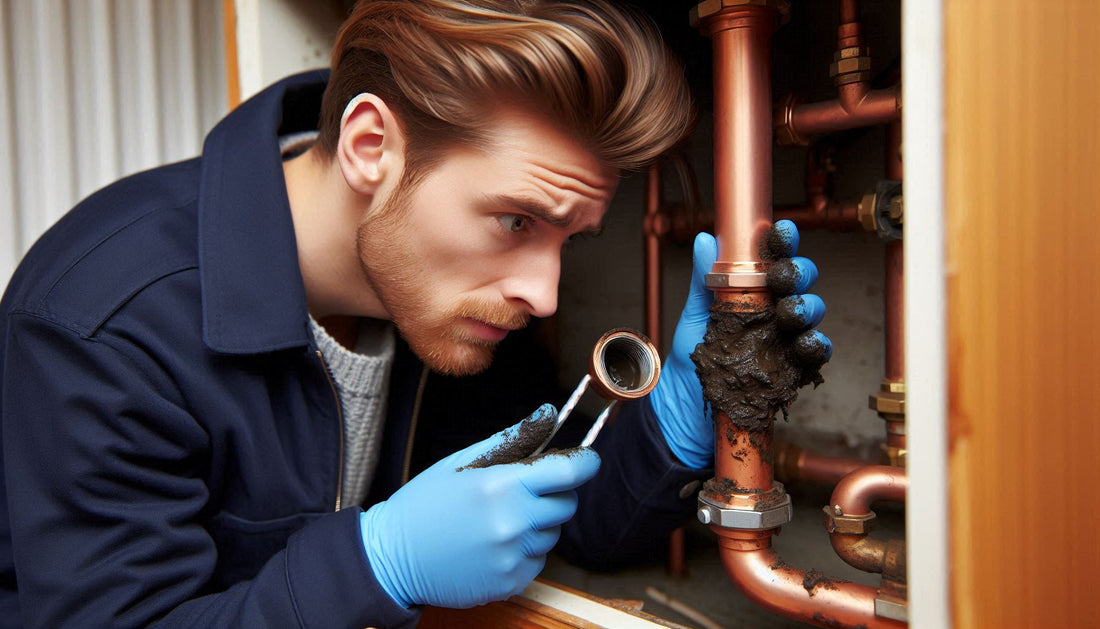A boiler chemical flush is a crucial maintenance process designed to keep your heating system in peak condition. Over time, central heating systems can accumulate various contaminants such as sludge, rust, and limescale. These deposits can severely impact the efficiency and performance of your boiler, leading to reduced heat output, higher energy bills, and even potential breakdowns. A chemical flush involves using specially formulated chemicals to remove these harmful deposits from the system, ensuring that your boiler operates smoothly and efficiently.
Common signs that your heating system might need a flush
1. Cold Spots on Radiators
- Issue: Radiators are warm at the top but cold at the bottom or have uneven heating.
- Cause: Sludge buildup at the bottom of radiators, preventing proper water circulation.
2. Noisy Boiler or Radiators
- Issue: Kettling sounds, banging, or gurgling noises from the boiler or radiators.
- Cause: Debris and sludge cause blockages, creating pressure differences and noise.
3. Slow to Heat Up
- Issue: The heating system takes longer than usual to reach the desired temperature.
- Cause: Reduced efficiency due to sludge and debris impeding water flow.
4. Frequent Boiler Shutdowns
- Issue: The boiler shuts down or needs frequent resetting.
- Cause: Overheating or pressure issues caused by blockages in the system.
5. Increased Energy Bills
- Issue: Noticeable increase in energy costs without a change in usage habits.
- Cause: The boiler works harder to heat the home due to reduced efficiency.
6. Discoloured Water When Bleeding Radiators
- Issue: Dark, dirty, or sludgy water when bleeding radiators.
- Cause: High levels of sludge and debris in the system.
7. Reduced Efficiency of the Heating System
- Issue: Overall reduction in heating performance and efficiency.
- Cause: Accumulation of sludge and scale reducing the system’s ability to heat effectively.
8. Leaking Radiators
- Issue: Radiators are leaking or have water pooling around them.
- Cause: Corrosion caused by sludge and debris buildup leading to leaks.
9. Boiler Overheating
- Issue: The boiler frequently overheats or cuts out due to high temperatures.
- Cause: Blockages prevent proper water flow, causing the boiler to overheat.
10. Frequent Need for Bleeding Radiators
- Issue: Radiators need frequent bleeding to release trapped air.
- Cause: Sludge and debris can trap air, leading to pressure imbalances.
Benefits of a Chemical Flush
- Improved Efficiency: By removing sludge and scale, the heating system can operate more efficiently, leading to better heat distribution and lower energy bills.
- Extended Lifespan: Regular chemical flushing can prolong the life of your boiler and heating system components by preventing corrosion and wear caused by debris.
- Enhanced Performance: A clean system performs better, providing more reliable heating and hot water.
- Prevention of Breakdowns: Removing potential blockages and corrosive materials reduces the risk of breakdowns and costly repairs.
The Difference between Power Flush and Chemical Flush
Both power flushing and chemical flushing are effective methods to clean your heating system, but they differ in their approach. One or the other may have their own benefits and disadvantages depending on the type of system you have installed in your home.
Chemical Flush
A chemical flush, as described earlier, involves the use of chemical solutions to dissolve and dislodge the build-up of sludge, rust, and other debris within the boiler and the radiators. This method is particularly suitable for older systems or those that have not been properly maintained. The process usually consists of the following steps:
- Assessment: Our expert technicians will assess the condition of your heating system to determine the extent of the contamination and identify any underlying issues.
- Chemical Application: Specially formulated cleaning agents are introduced into the system. These chemicals effectively break down the accumulated debris and neutralize any corrosive elements.
- Circulation: The chemicals are circulated through the entire system, including radiators, pipes, and the boiler, ensuring comprehensive cleaning.
- Flush Out: After a specified period, the system is thoroughly flushed out, removing the loosened debris and chemical residue.
- Inhibitor Addition: To protect your heating system from future corrosion, we add an inhibitor that helps prevent the accumulation of sludge and rust.
Power Flush
Power flushing, on the other hand, is a more robust method that involves the use of a dedicated power flushing machine. The process includes the following steps:
- Preparation: Before starting the power flush, we isolate the boiler from the rest of the system and connect the power flushing machine to the heating circuit.
- High-Velocity Water: High-velocity, low-pressure water is then sent through the system. The force of the water dislodges and carries away the accumulated debris.
- Agitation: To aid in dislodging stubborn sludge and rust, we may use chemicals or magnetic filters during the power flush process.
- Flush Out: As with the chemical flush, the system is thoroughly flushed out to remove any remaining debris and sludge.
- Inhibitor Addition: Like the chemical flush, an inhibitor is added to protect the system from future corrosion.
Which One Is Right for Your Boiler?
The choice between a chemical flush and a power flush depends on the condition of your heating system. Generally, a chemical flush is more suitable for older systems with significant build-up. Power flushing is recommended for heavily contaminated systems or when a chemical flush alone may not suffice. Our experienced engineers will assess your heating system and recommend the most appropriate method to ensure your boiler's optimal performance and longevity.
At Union Plumbing & Heating, we take pride in providing truly unbeatable services to ensure your heating system operates efficiently and reliably. Contact us today to schedule a thorough assessment and enjoy the benefits of a clean and well-maintained boiler.



